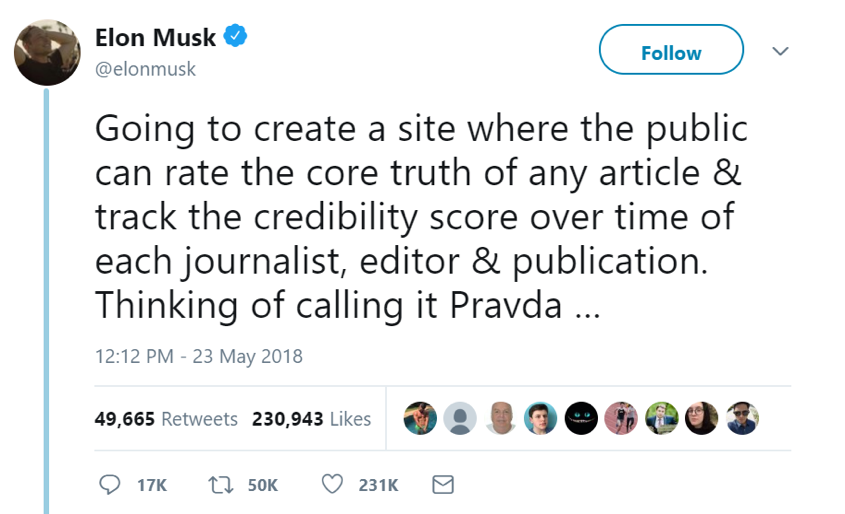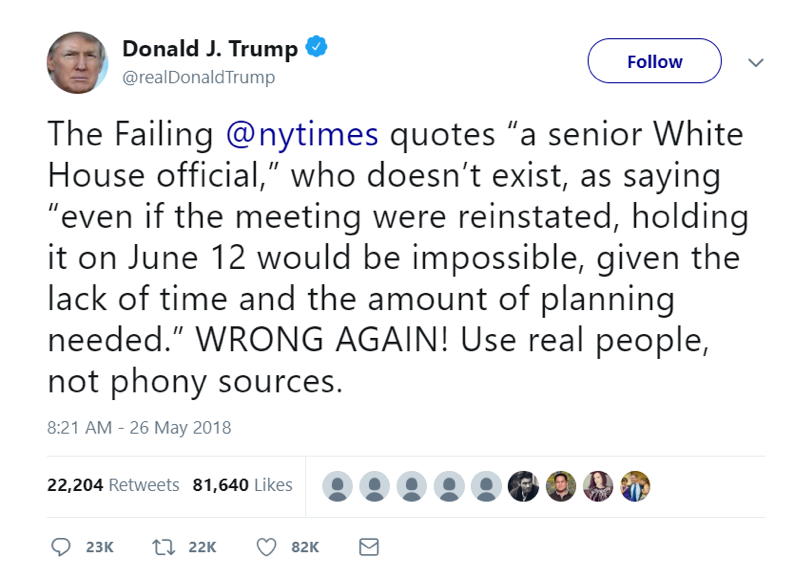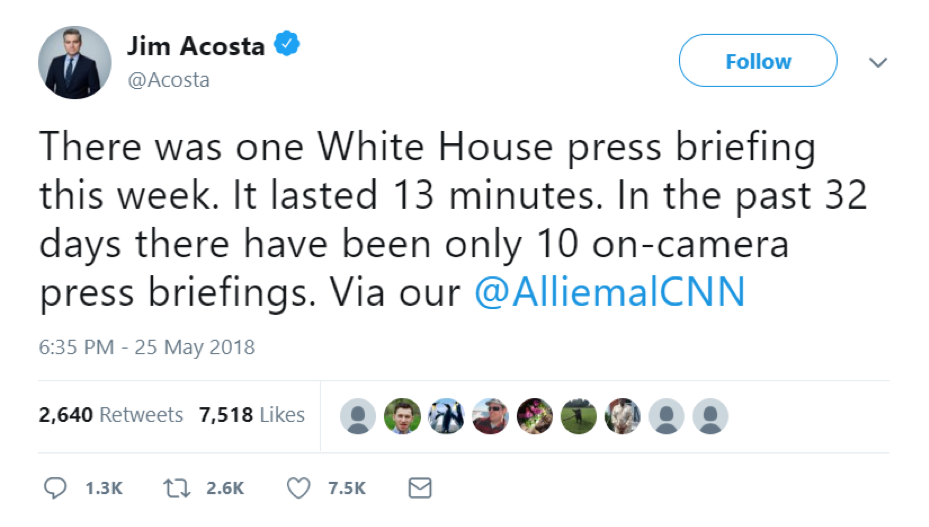US - #WeeklyAddress: May 21-27: EPA bars news outlets from summit on dangerous water contaminants
Below are the most notable incidents regarding threats to press freedom in the US during the week of May 21-May 27:
EPA bars news outlets from summit on dangerous water contaminants
At a May 22 Environmental Protection Agency (EPA) conference about the harmful effects of chemicals in drinking water, several publications were blocked from attending, resulting in one journalist being forcibly shoved out of the building. The following day the agency again barred reporters from entry. To learn more about this incident, read RSF’s publication: “RSF denounces Environmental Protection Agency’s barring of news outlets from summit.”
Elon Musk lashes out at media; proposes journalist credibility tracker
Tesla and SpaceX CEO Elon Musk announced in a May 23 tweet his idea for a website where users can rate the credibility of articles, news outlets, and journalists.

His tweet follows a slew of critical reporting on Tesla’s spending habits, and a specific report published by Reveal, a website run by the Center for Investigative Reporting, that outlines the questionable approach Tesla takes toward reporting accidents and dealing with injuries in its factories. Musk denied the problems outlined in the report, saying the claims are “demonstrably false, but were reported as ‘facts’ by Reveal.” Tesla published a statement calling Reveal an “extremist organization” that is actively targeting the company as part of a "disinformation" campaign to spur the unionization of his factories. This isn’t Musk’s first time denouncing the media for reporting so-called falsehoods. In 2013, the billionaire attacked The New York Times after it reported on one of Tesla’s car models underperforming.
Prominent US general jokes about Tampa Bay mayor shooting reporters
The commander of US Special Operations Command, General Tony Thomas, made a joke about Tampa, Florida Mayor Bob Buckhorn “taking it out on the media with a .50 cal” at a special operations industry conference on May 22. Thomas later apologized for his comment, which received media backlash, saying he has multiple journalists he considers “confidants” and that he “appreciate[d] the[ir] relationship.” The joke appeared to reference Mayor Buckhorn’s 2016 spectacle, where he shot blank bullets from a mounted .50 caliber machine gun at reporters, later stating: “I’ve never seen grown men cry like little girls, for when that gun goes off those media folks just hit the deck like no one’s business. It’s great payback. I love it.” Jokes about violence against reporters have also come from the federal level. After President Donald Trump received a ceremonial saber from the graduating class at the Coast Guard Academy’s commencement in May 2017, Secretary of Homeland Security John Kelly was caught on a hot mic joking, “Use that on the press, sir.”
Trump tells 60 Minutes reporter he intends to discredit the press with anti-media rhetoric
On May 22, 60 Minutes reporter Leslie Stahl recounted on “PBS NewsHour” a 2016 conversation with President Donald Trump and an audience of reporters, during which Trump said he incessantly attacks the press “to discredit you all and demean you all so that when you write negative stories about me no one will believe you." The White House has since turned down requests for a response on Stahl’s report. Trump’s efforts to diminish trust in the press have been a common occurrence throughout his presidency, as exemplified most recently in a May 9 tweet claiming: “91% of the Network News about me is negative (Fake).”
Trump claims NYTimes source doesn’t exist
In a May 26 tweet, Donald Trump falsely claimed a New York Times article used “phoney sources” in a June 12 report on the summit between the United States and North Korea, which cited “a senior White House official.”
 The New York Times responded to the accusations, outlining the current administration’s press briefing rules, one of which mandates all spokespersons be referred to as “senior White House official.” The official held a May 24 briefing in the White House briefing room that was attended by about 50 reporters, with another 200 or so on a conference call, according to The Times. It is unclear whether the president was simply unaware of his staff’s actions or if this was another deliberate attempt to undermine negative press levied against him.
The New York Times responded to the accusations, outlining the current administration’s press briefing rules, one of which mandates all spokespersons be referred to as “senior White House official.” The official held a May 24 briefing in the White House briefing room that was attended by about 50 reporters, with another 200 or so on a conference call, according to The Times. It is unclear whether the president was simply unaware of his staff’s actions or if this was another deliberate attempt to undermine negative press levied against him.
White House held only 10 on-camera press briefings in past month
In a May 25 tweet, CNN’s Chief White House Correspondent Jim Acosta highlighted how few on-camera briefings have been held at the White House in the span of a month.

Last summer, White House correspondents expressed similar concerns about the dwindling number of on-camera press briefings. Between June 29 and July 21, 2017, the White House did not hold a single briefing on camera, nor did it allow live audio recordings.
The United States ranks 45th out of 180 countries in RSF's 2018 World Press Freedom Index after falling 2 places in the last year.
For the latest updates, follow RSF on twitter @RSF_en.



